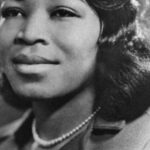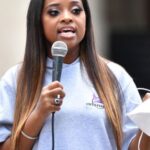
Source: Courtesy of Mabel and Shaira Frías / Black is Bella
Moderated by journalist and socio-cultural editor Johanna Ferreira, Black Is Bella was a virtual event held yesterday where viewers tuned in as Lulu Cordero of Bomba Curls, Mabel and Shaira Frías of Luna Magic Beauty, and Ada Rojas of the blog All Things Ada all chatted about what it means to redefined beauty as Afro-Latinas.
As a way to give the conversation some context, at the top of the virtual event Ferreira explained, “Even though Afro-Latinx are just as much a part of the African Diaspora, because of America’s misconceptions of race and ethnicity we’re still often excluded from dialogues surrounding Blackness and beauty. Latinidad in the US still often associate Latinas with having fair skin, Eurocentric features, and dark, straight, or wavy hair — pretty much Sofía Vergara.” Additionally, Ferreira made a point to mention “anti-Blackness continues to dictate Latin-American beauty standards.”
Down below, the Black Is Bella panelists shared personal insights on how beauty standards shaped their Afro-Latina identities and inspired the businesses they have now.

Source: Courtesy of Lulu Cordero / Black is Bella
Lulu Cordero
“In my case I have always identified as Negra,” Cordero said before adding, “I have always identified as Black and proud — Negra y orgullosa. A lot of that has to do with the community that I’m from in the Dominican Republic, we’ve done a pretty great job at preserving a lot of our African cultural traditions and heritage so there’s a lot of pride there. Also, my mom made sure to plant the seeds of self-love in me very, very, very early on in life. I’m so grateful to her because she knew that I would be growing up in a world that didn’t celebrate Blackness or women that look like us and she wanted to prepare me to be strong, love myself, and be ready for whenever someone would say nasty, disparaging things that are unfortunately — whether people want to admit it or not — a part of Dominican culture and prevalent through Latin America. It’s anti-Blackness.”
“Bomba Curls was started because of the lack of representation,” she added. Speaking about the standard of beauty she saw growing up she said, “I never saw women that looked like my mother, grandmother, or even the women on this panel. I didn’t see various hair textures or skin tones represented — and that is what I wanted to make different about my brand. I wanted to fight the stigma associated with Black hair, beauty, and skin. Now I fight to not only decolonize our community but also the beauty standards. The point of my brand and my entrepreneurship is to decolonize it all.”


